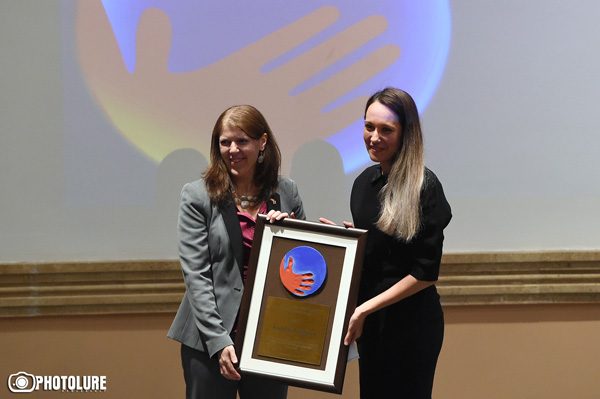On December 11, 2017, at the Universal Rights Awards Annual ceremony in Yerevan, Isabella Sargsyan, Human Rights Program Director of Eurasia Partnership Foundation (EPF), received the Freedom Defender Award.
The Annual ceremony is an initiative of the international community of Armenia, and takes place every year around the Human Rights Day since 2012. The event is co-sponsored and co-organized by United States, European Union, United Nations, Council of Europe, and United Kingdom of Great Britain and Northern Ireland. This year Germany and France joined the group of sponsors as well. Six people or organizations received awards on this occasion, and Isabella was one of them. Please see the official press release of the event.
The award was handed to Isabella by the Deputy Head of Mission of the United Kingdom of Great Britain and Northern Ireland Ms. Alison Chick, in recognition of tireless efforts to promote diversity, freedom and religious acceptance. “Isabella is a person trying to give a voice to those who don’t feel strong enough to speak for themselves, supporting religious communities to find their voice and speak what is required to get to tolerance”, said Ms. Chick.
EPF is happy and proud to publish the Freedom Defender Award speech of Isabella Sargsyan.
“I would like to thank you for the award. First of all, this is a responsibility.
I would like to mention that it is difficult to find a place more symbolic than Matenadaran for awarding a prize dedicated to diversity, religious tolerance and freedom of thought. Just in front of the entrance, you can see Mesrop Mashtots, as well as senior and junior translators Yeghishe, Movses Khorenatsi, David Anhaght, Grigor Narekatsi and others who were the founders of the Armenian translation and scribe movement. In my opinion, the translation movement which emerged after the creation of the alphabet had two main objectives.
On the one hand, it strengthened the sovereignty of Armenia, from the perspective of the medieval perception of the concept. But at the same time, Armenia opened itself to the world, through translation, it also allowed the world and its diversity to be transmitted into the Armenian language.
Translation is essentially a two-way channel that allows the reciprocity of ideas, cultures, religions, and experiences, enabling them to be presented in your language. The material translated into the Armenian language both from the eastern and western languages is colossal and very diverse. Moreover, it is no coincidence that the Armenian Church celebrates Holy Translators’ Day, paying tribute to the people who exposed Armenia to the world and conveyed the world’s knowledge to Armenia.
I think in a situation without sovereignty and statehood for centuries, being open to the world, acknowledging others, recognizing others’ cultures, religions and lifestyle, deepening contacts with various nations became the key way in which the Armenian people avoided isolation, and also did not end up provincial, marginal or displaced from the political map of the world. I think this is a good lesson for all of us.
I have no doubt that for us as a 21st century sovereign nation it is very important to be open and improve relations with our neighbors and stop focusing on nation-army, one nation-one culture, one nation-one religion and similar isolationist ideas, but to be open to the world, and bring the world to Armenia. These ideas could lead us to such a deadlock and to such irreversible consequences, threatening the sovereignty that Armenia craved for centuries and its very existence on the political map of the world.
Regarding the award, I regard it as an acknowledgment of the work of many people who are the translators and the educators of the 21st century; they are the people who provide a channel for transmitting universal values, ideas and experiences into the Armenian reality. Many of these people are present in this hall.
Thank you again”.




















































